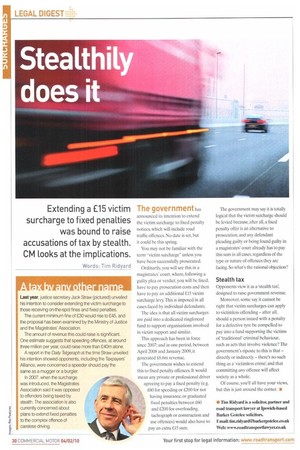Extending a 05 victim surcharge to fixed penalties was bound
Page 30

If you've noticed an error in this article please click here to report it so we can fix it.
to raise accusations of tax by stealth. CM looks at the implications.
Words: Tim Ridyard The government has announced its intention to extend the victim surcharge to fixed penalty notices, which will include road traffic offences. No date is set, but it could be this spring.
You may not be familiar with the term "victim surcharge" unless you have been successfully prosecuted.
Ordinarily, you will see this in a magistrates' court, where, following a guilty plea or verdict, you will be fined. have to pay prosecution costs and then have to pay an additional £15 victim surcharge levy. This is imposed in all cases faced by individual defendants.
The idea is that all victim surcharges are paid into a dedicated ringfenced fund to support organisations involved in victim support and similar.
This approach has been in force since 2007: and in one period, between April 2008 and January 2009, it generated £6.6m revenue.
The government wishes to extend this to fixed penalty offences. It would mean any private or professional driver agreeing to pay a fixed penalty (e.g. 160 for speeding or £200 for not having insurance, or graduated fixed penalties between £60 and £200 for overloading, tachograph or construction and use offences) would also have to pay an extra £15 sum. The government may say it is totally logical that the victim surcharge should be levied because, after all, a fixed penalty offer is an alternative to prosecution, and any defendant pleading guilty or being found guilty in a magistrates' court already has to pay this sum in all cases, regardless of the type or nature of offences they are facing. So what's the rational objection'?
Stealth tax
Opponents view it as a 'stealth tax', designed to raise government revenue.
Moreover, some say it cannot be right that victim surcharges can apply to victimless offending — after all, should a person issued with a penalty for a defective tyre be compelled to pay into a fund supporting the victims of 'traditional' criminal behaviour, such as acts that involve violence? The government's riposte to this is that — directly or indirectly — there's no such thing as a 'victimless crime', and that committing any offence will affect society as a whole.
Of course, you'll all have your views, but this is just around the corner. • • rmt Ridyard is a solicitor, partner and road transport lawyer at lpswith-based Barker Gotelee solicitors.
Email: tim.ridyard@barkergotelee.coalk Web: www.roadtransportlawyer.co.uk




































































































































